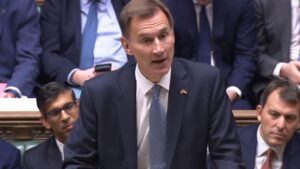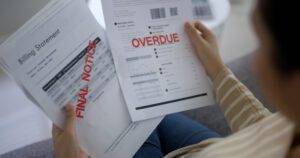Chancellor is ‘likely to miss debt target’ despite record tax take

<?xml encoding=”utf-8″ ?????????>
The UK’s borrowing costs rose less than expected last month on the back of rising tax receipts and a lower debt interest bill, but economists have warned that the government is still in danger of missing its fiscal targets.
Official figures showed that public sector net borrowing was £4.3 billion in July, less than the £6 billion estimated by the Office for Budget Responsibility, the government’s independent budgetary watchdog. Private sector economists expected the bill to hit £4.9 billion.
The public finances have been boosted in recent months by high inflation leading to record tax receipts for the Treasury, with workers being dragged into higher income tax brackets.
Business briefing Morning and midday updates on financial and economic news from our award-winning business team. Sign up with one clickThe ONS said that the government received £65.6 billion in taxes last month, nearly £4 billion higher than a year earlier, with income tax, corporation tax and VAT receipts all on the rise.
Public borrowing is usually lower in July — the month in which self-assessment tax income is recorded in the national finances. The ONS said that self-assessment receipts totalled £11.8 billion last month, nearly £2 billion more than the OBR forecast in March. Overall borrowing in the fiscal year starting April is running £11 billion below the watchdog’s projections.
Economists warned that the outlook for public finances had deteriorated, though, after a recent climb in UK bond yields that will add pressure on the government’s debt servicing costs. The yield on the UK’s benchmark ten-year gilt touched the highest level since 2008 last week at 4.7 per cent.
The ONS said that the July debt interest bill was £7.7 billion, below the £8 billion expected, as inflation fell slightly more than expected. Rising inflation, as measured by the retail price index (RPI), has driven up the cost of servicing inflation-linked bonds, which make up about a quarter of the UK’s outstanding debt. The official measure of RPI rose to 11.3 per cent in May, the month to which interest payments for July are linked.
Ruth Gregory, at Capital Economics, warned that a slowing economy in the second half of the year would result in lower tax receipts while the jump in gilt yields was likely to add £18 billion to the Treasury’s debt interest bill by 2028.
Martin Beck, economic adviser to the EY Item Club, said the OBR was likely to warn that the chancellor will not meet his target to have debt on a declining path in the next five years or to balance day-to-day spending.
“The period since the OBR’s last forecast has seen market expectations for interest rates rise markedly out to the end of the OBR’s forecast horizon. Combined with the little leeway in meeting the fiscal rules forecast in the spring budget, this raises the odds that the official forecaster will deem the government in breach of its fiscal rules based on current policy in the next fiscal event later this year,” Beck said.
Jeremy Hunt, the chancellor, will deliver his third budget in the autumn and has little fiscal room for tax giveaways. “As inflation slows, it’s vital that we don’t alter our course and continue to act responsibly with the public finances,” he said. “Only by sticking to our plan will we halve inflation, grow the economy and reduce debt.”
The UK’s overall debt ratio fell to 98.5 per cent from the 100.8 per cent recorded in June, the highest since the 1960s.




